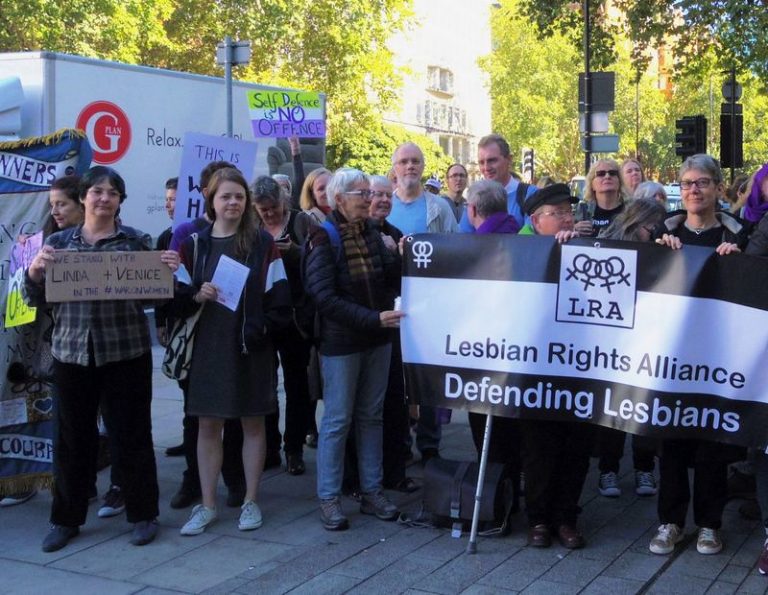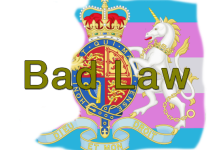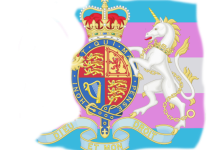By Jo Bartosch
Jo Bartosch talks to Lynne Harne
“We should be allowed to assert our exclusivity as a group of women who are sexually-attracted to other women.”
As with many feminists of the second wave, Lynne Harne has seen enough misogyny to spot it whether it hides behind a pulpit or rainbow flag. Harne is one of the founders of the Lesbian Rights Alliance (LRA), and she spoke to me about what first brought the group together, what they hope to achieve and the changes they’ve already made.
The LRA was formed in 2017, after a series of events that left Harne and the other members in no doubt that a lesbian group was needed to offer an alternative to the government-funded LGBT organisations. ‘Dyke march’ in 2014 made it obvious to Harne what the problem was:
We had already become aware of the absurd idea that some crossdressing heterosexual males were claiming to be lesbians… they [Dyke march’s organisers] had invited a trans identified male Sarah Brown to be their key speaker at the start of the march. We met with a lot of hostility, mainly from the young heterosexual women who were there. They tried to snatch our leaflets – which stated ‘Men can’t be lesbians’ – and tear them up. No doubt they would have been even more violent if the police had not been present.
The following year Harne gave a speech at a radical feminist conference. There she met several younger lesbians who were rejecting the ideology of gender identity.
“They talked about the pressures on them to transition in their sixth forms. At this conference they found alternative support in radical lesbian feminism. This group of young lesbians, who mainly live in London and are now in their 20s, have been active in the Lesbian Rights Alliance campaigns.”
Finally, it was hearing from ‘medical detransitioners’ at the newly re-established Lesbian History Group that inspired Harne and the others to take action. She recalls:
“One of them even described being sectioned in her teens and being forced to conform to take on a feminine appearance before she was allowed to leave the psychiatric ward. They also described how easy it was to obtain hormone treatment and get mastectomies and how much this had seriously harmed their bodies. They stated that many young lesbians who had transitioned had been sexually abused in childhood and most had mental health problems which they believed would be resolved by transitioning.”
This was the crucible in which the LRA’s campaigning was forged, “with the aims of making lesbians visible again, standing up for women’s and lesbian rights.”
In the early days, secrecy was necessary, with the membership “largely operating under the radar, so that they wouldn’t be attacked by trans activists.” LRA’s members were right to be wary; before the group was even formed two had had been reported to their employers following the Dyke march protest.
Right from their inception the LRA were sneered at and dismissed by voices of the establishment. Harne recalls self-described ‘gobby feminist’ Jess Phillips MP telling them “‘we would never win’ against the trans agenda.”
Instead, one ally came in the form of Conservative David Davies MP, who “was prepared to give us a platform in the House of Commons where he organised a meeting in early 2018.”
Following this “One Labour MP was able to get us invited to talk at the Parliamentary Women’s Labour group… we invited three young lesbians from London to speak to these MPs about their experiences and how they had been affected by transgender ideology.”
“With existing “self-identity” laws, and the proposition that they become even more flexible, the ability to be lesbians and be together is eradicated. We lose women who are told they are men, and we are saddled with men who claim to be women. And we are expected not to question this.”
The speakers related their first-hand experiences of the pressures on young lesbians to transition. One recalled her time at university where she felt as if people around her were “watching the clock ticking, just poised and waiting for me to confirm their belief that there is no such thing as a lesbian… that I was a trans man.”
She added:
“We should be allowed to assert our exclusivity as a group of women who are sexually-attracted to other women. With existing “self-identity” laws, and the proposition that they become even more flexible, the ability to be lesbians and be together is eradicated. We lose women who are told they are men, and we are saddled with men who claim to be women. And we are expected not to question this.”
After speaking in Parliament and several fruitless meetings with the Government Equalities Office the LRA shifted focus onto the LGBT organisation, Stonewall. An open letter, part of which was published in The Times, called for the removal of the ‘L’ from the ever-expanding ‘queer’ acronym. Following this, some of the LRA’s members took part in the lesbian protest at Pride in the summer of 2018 alongside other groups.
Working alongside groups such as Transgender Trend and the Safe Schools Alliance, the LRA has begun to challenge transgender ideology in schools. Harne explains:
“As a lesbian mother myself with two school age granddaughters I am particularly motivated to challenge the indoctrination of school children to believe they all have a gender identity which can easily be changed, all accompanied by extreme sexist and sexualised stereotypes of what it means to be female for girls. It is terrifying to think that girls may never have the possibility of being lesbian, because of this indoctrination.”
Last year, the LRA discovered that Stonewall had produced materials designed for use by parents during lockdown including the cartoon ‘Jamie – a Transgender Cinderella Story’. Harne says the cartoon “deliberately misrepresented a gender non-conforming young lesbian as a boy.” The LRA both wrote to Women and Equalities Minister Liz Truss MP and organised a protest outside of the Department of Education offices.
Harne believes the actions of the LRA were instrumental in the Department for Education’s updated guidance last year, which now explicitly warns schools not to work with groups that promote the fallacy that children can be ‘born in the wrong body.’ Indeed, a number of statutory bodies have dropped their membership of the Stonewall Champion’s Scheme since groups including the LRA began to undermine Stonewall’s legitimacy and question their accuracy.
Last year, the LRA discovered that Stonewall had produced materials designed for use by parents during lockdown including the cartoon ‘Jamie – a Transgender Cinderella Story’. Harne says the cartoon “deliberately misrepresented a gender non-conforming young lesbian as a boy.” The LRA both wrote to Women and Equalities Minister Liz Truss MP and organised a protest outside of the Department of Education offices.
The LRA is “the first visible Lesbian only group campaigning against the trans agenda” and Harne is proud of the organisation’s role in encouraging “other lesbian feminist groups to organise and be more visible.” Since their formation in 2017 other groups have emerged including Lesbian Strength which organised a large Lesbian Strength march in Leeds in 2019, and very recently Lesbian Labour. She believes “the regeneration of lesbian feminist culture is beginning to happen… we have influenced other countries such as New Zealand to set up their own Lesbian Rights Alliance. We also get requests from parents asking us how to support their lesbian daughters who may want to transition.”
The pressure on young lesbians to identify as ‘trans men’ is unabating, the LRA’s Labrys Project which was created by young lesbians in London exists to counter this by offering “support to young lesbians and provide positive lesbian alternatives to queer/LGBT culture.” A new website is due to be launched in May. In addition to resources for young people, the LRA has plans to help parents of young lesbians on the new website.
“One of things we are aiming to do is to inform these lesbians that there is a lesbian community out there which they can join and develop. Currently, queer culture puts pressure on young lesbians to engage in compulsory heterosexuality and harmful sexual practices such as pornography, BDSM and Kink, which as lesbian feminists we don’t support. In the longer term the Labrys project will be setting up a youth group for young lesbians in London.”
“Currently, queer culture puts pressure on young lesbians to engage in compulsory heterosexuality and harmful sexual practices such as pornography, BDSM and Kink, which as lesbian feminists we don’t support. In the longer term the Labrys project will be setting up a youth group for young lesbians in London.”
Harne says she is “glad” that more gay men are speaking-up for the right to be same-sex attracted, but that as “lesbian feminists we don’t see ourselves as a part of LGB culture.” Today the LRA has a growing membership of over 200 women, including lesbian allies who are often mothers with lesbian daughters.
The LRA is laying the foundations of a female-focused community. Harne and those who stand with her have not only shone a light into the workings of Stonewall, they have amplified the voices of young lesbians who feel shamed and silenced by the very organisations that purport to represent them.
The LRA’s position is not only lesbian, it is proudly feminist. As Harne concludes:
“In our view, the transgender movement is a new form of male power, which as a men’s sexual rights movement has set out to destroy women’s resistance to male supremacy and in particular our resistance to male sexual violence towards women, as well as our control over our own reproductive capacities. It has deliberately recruited lesbians into its male ranks to give it more credibility. But however powerful it is as a movement it cannot actually stop lesbian resistance nor cannot it destroy the renewal of lesbian culture.”
To get involved and read more about the Lesbian Rights Alliance please go to their website: https://lesbianalliance.org.uk
THIS ARTICLES WAS FIRST PUBLISHED IN LESBIANANDGAYNEWS



